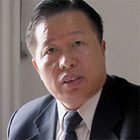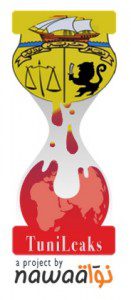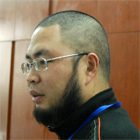11 Mar 2011 | Uncategorized
Awards judge Gugulethu Moyo introduces the nominees for the Bindmans Law and Campaigning award
When thinking about freedom of expression, it’s easy just to focus on the headlines. But it is often the work behind the scenes that makes the difference, so the law and campaigning award is crucial in recognising the champions of free speech. This year’s shortlist demonstrates clearly that tools to silence are used by both dictatorships and democracies – and that those committed to making sure unheard voices are listened to often do so at great personal risk. This year we turn our attention to Pakistan, where those working to change an incredibly hostile climate for free speech have found themselves under fierce attack. In China, those defending campaigners against land redistribution or promoting religious freedom meet with heavy penalties and often risk their lives. And we look at the United States, where the government’s preoccupation with national security has overridden one of its citizen’s human rights. It’s more important than ever to honour those who take on this difficult and complex work – and it’s thanks to them that rigorous legal work plays a key role in keeping freedom of expression in a prominent position on the international stage.
David Coombs
 David Coombs is the criminal defence lawyer leading the defence of Specialist Bradley Manning, the 23-year-old US army intelligence analyst accused of leaking classified material to WikiLeaks. Manning faces a court martial and up to 52 years in prison.
David Coombs is the criminal defence lawyer leading the defence of Specialist Bradley Manning, the 23-year-old US army intelligence analyst accused of leaking classified material to WikiLeaks. Manning faces a court martial and up to 52 years in prison.
Despite Coombs’s complaints, Manning has been held in solitary confinement in a military brig on a Prevention of Injury (POI) order since July 2010. This order, usually used for short
periods prior to a psychological evaluation, limits his social contact, news consumption, ability to exercise and sleep. Coombs has used his blog to detail Manning’s experiences in solitary confinement.
Coombs called an assertion by a Pentagon Press Secretary that Manning is being treated like every other detainee at the Quantico brig “patently false”. His work has been pivotal in making Manning’s ordeal public.
Gao Zhisheng
 Chinese lawyer Gao Zhisheng has been persecuted by the state for speaking out on human rights issues. Gao, a self-taught lawyer, forged a career representing the underdog in cases involving medical malpractice, land redistribution, employment disputes and forced sterilisation.
Chinese lawyer Gao Zhisheng has been persecuted by the state for speaking out on human rights issues. Gao, a self-taught lawyer, forged a career representing the underdog in cases involving medical malpractice, land redistribution, employment disputes and forced sterilisation.
He has also defended journalists and religious minorities including Christians and members of Falun Gong. In 2005, he resigned from the Communist Party and wrote an open letter to President Hu Jintao and Prime Minister Wen Jiabao, documenting the suffering of Falun Gong practitioners and calling on the leaders to end their “large-scale, organised” abuse.
Security forces took Gao from his home in Shaanxi province on 4 February 2009. Gao claimed the security forces tortured him. The state denied any knowledge of his whereabouts until January 2010, when a foreign ministry official said the lawyer was “where he should be”. Gao disappeared again in April 2010, and the Chinese state has refused to register him as a missing person.
Sherry Rehman
 Sherry Rehman is a member of Pakistan’s parliament and chair of the Jinnah Institute, a think tank committed to “policies that promote fundamental rights, tolerance and pluralism”. For ten years Rehman served as editor-in-chief of the Herald, and from 1988 to 1998 she served as a member of the Council of Pakistan Newspaper Editors.
Sherry Rehman is a member of Pakistan’s parliament and chair of the Jinnah Institute, a think tank committed to “policies that promote fundamental rights, tolerance and pluralism”. For ten years Rehman served as editor-in-chief of the Herald, and from 1988 to 1998 she served as a member of the Council of Pakistan Newspaper Editors.
In November 2010, Rehman submitted a bill proposing amendments to Pakistan’s blasphemy law, which is routinely used to silence dissent and as a tool of intimidation against non-Muslims and members of minority Muslim sects.
Rehman and her late PPP colleague Salman Taseer were vocal critics of Pakistan’s blasphemy law. They were vociferous in their support of Aasia Bibi, a Christian woman sentenced to death after Muslim neighbours claimed she had blasphemed against Islam following an argument. After the assassination of Taseer by his bodyguard, Rehman was forced to withdraw her bill in February 2011.
11 Mar 2011 | Uncategorized
Awards judge David Rowan introduces the nominees for the Index on Censorship New Media Award, supported by Google
In a year when WikiLeaks held government activities to unprecedented scrutiny, and Facebook and Twitter empowered citizens in articulating their concerns, the judges sought to honour those especially courageous internet activists who braved hostile conditions to promote free expression. Wen Yunchao, based in Guangdong, has taken huge risks to become one of China’s most outspoken bloggers and campaigners for free speech – not least by organizing a Twitter “Empty Chairs” protest to mark Liu Xiaobo’s winning the Nobel Peace Prize. The activists behind TuniLeaks – a collaboration between Nawaat.org and WikiLeaks – confirmed with cold documents the widely criticised corruption of President Ben Ali’s regime, and helped focus public discontent. The judges recognised the long-term role played by the Tor Project as a means of helping activists bypass traditional censors – whose impact was evident in huge traffic spikes as protests grew in Egypt and Tunisia. Finally, the judges wanted to pay special tribute to Wael Ghonim, a local Google employee detained for 11 days by the Egyptian police, who was revealed to be the administrator of the Facebook page “We are all Khaled Said”. Named for a young businessman who died in Egyptian police custody, the page became a rallying point in the popular uprising.
TuniLeaks by Nawaat
 TuniLeaks is a selection of the WikiLeaks State Department cables published by Nawaat.org, an independent group blog run by Tunisian net activists.
TuniLeaks is a selection of the WikiLeaks State Department cables published by Nawaat.org, an independent group blog run by Tunisian net activists.
TuniLeaks, like its parent site Nawaat, is entirely independent and does not receive funds from any political party.
The TuniLeaks cables revealed the extent of the corruption deeply entrenched in many aspects of Tunisian life. Despite attempts to block the site, news of the cables being released swiftly spread around the country and Nawaat helped informal media networks link communities that had been cut off by government censors.
Nawaat highlights how important transparency is in a country like Tunisia, where citizens had for so many years been cut off from vital information and dialogue. “The aim is to get everyone to read, to get an idea and give meaning to the facts provided,” the website states. “The debate is open.”
The Tor Project
Tor enables whistleblowers, dissidents and activists to communicate safely.
It began as The Onion Router project in 2002, originally sponsored by the US Naval Research Laboratory. Among its founders are Roger Dingledine, Nick Mathewson and Paul Syverson.
Designed to increase privacy and security, internet users are able to access censored sites via a third party and conceal their browsing history. Communications via instant messaging are similarly protected. The Tor system is continuously updated and developed in order to address the vulnerability inherent within web-based systems. The software “does not modify, or even know, what you are sending into it”, the Tor site states. “It merely relays your traffic, completely encrypted through the Tor network and has it pop out somewhere else in the world, completely intact.”
The use of Tor technology in Egypt increased fourfold in the weeks leading up to the overthrow of Hosni Mubarak, and a similar pattern was seen in Tunisia.
Wen Yunchao
 Wen Yunchao is a Guangdong-based internet activist. Writing for platforms including the now banned bullog.cn, Wen established himself as one of China’s best-known bloggers under the alias Bei Feng. He started his career as a news reporter before becoming the editor of Guangzhou’s Yangcheng Evening News website. In 2009, Wen left to research internet censorship. He has spoken about his work as a censor and member of the “50 cent” group (state-funded commenters paid 50 cents for every pro-government comment).
Wen Yunchao is a Guangdong-based internet activist. Writing for platforms including the now banned bullog.cn, Wen established himself as one of China’s best-known bloggers under the alias Bei Feng. He started his career as a news reporter before becoming the editor of Guangzhou’s Yangcheng Evening News website. In 2009, Wen left to research internet censorship. He has spoken about his work as a censor and member of the “50 cent” group (state-funded commenters paid 50 cents for every pro-government comment).
Wen now works to remove restrictions on information and champions freedom of speech. When Southern Weekly editor Chang Ping was fired in early 2011, Wen Yunchao helped spread the word, organising netizens to donate to Chang Ping’s account to show their support. He also organised Twitter’s “empty chairs” event to mark Liu Xiaobo winning the Nobel Peace Prize.
Wen was among the second group of signatories of Charter 08, the manifesto signed by more than 350 Chinese intellectuals and human rights activists.
17 Feb 2011 | Index Index, minipost, News and features
Turkish foreign minister Ahmet Davutoglu has dismissed remarks made by the US ambassador in Ankara. Diplomat Francis J Ricciardone expressed concerns about press freedom in the country. His comments came in response to the detention of four journalists following a raid on opposition news portal Oda TV. The foreign minister said that he did not think it was right for “ambassador to pass judgment on an ongoing criminal investigation”, and claimed press freedom was not the issue.
15 Feb 2011 | Digital Freedom, Uncategorized
Anyone interested in free expression will be anticipating Hillary Clinton’s speech on web freedom today, particularly as in light of recent events throughout the Middle East, it seems that one cannot really talk about web freedom without meaning, well, freedom freedom.
Clinton is expected to say:
“Together, the freedoms of expression, assembly, and association online comprise what I have called the freedom to connect. The United States supports this freedom for people everywhere, and we have called on other nations to do the same… “
The speech continues:
“We are convinced that an open Internet fosters long-term peace, progress and prosperity. The reverse is also true. An Internet that is closed and fractured, where different governments can block activity or change the rules on a whim—where speech is censored or punished, and privacy does not exist—that is an Internet that can cut off opportunities for peace and progress and discourage innovation and entrepreneurship…”
There is a certain irony to the privacy comments, with Clinton’s speech coming on the same day that the US is attempting to force Twitter to hand over details of Wikileaks-linked users.
Index will be publishing reaction to the speech from a range of experts, plus the full text of the speech. In the meantime, here are some snippets, courtesy of Politico’s Laura Rozen.
 David Coombs is the criminal defence lawyer leading the defence of Specialist Bradley Manning, the 23-year-old US army intelligence analyst accused of leaking classified material to WikiLeaks. Manning faces a court martial and up to 52 years in prison.
David Coombs is the criminal defence lawyer leading the defence of Specialist Bradley Manning, the 23-year-old US army intelligence analyst accused of leaking classified material to WikiLeaks. Manning faces a court martial and up to 52 years in prison. Chinese lawyer Gao Zhisheng has been persecuted by the state for speaking out on human rights issues. Gao, a self-taught lawyer, forged a career representing the underdog in cases involving medical malpractice, land redistribution, employment disputes and forced sterilisation.
Chinese lawyer Gao Zhisheng has been persecuted by the state for speaking out on human rights issues. Gao, a self-taught lawyer, forged a career representing the underdog in cases involving medical malpractice, land redistribution, employment disputes and forced sterilisation. Sherry Rehman is a member of Pakistan’s parliament and chair of the Jinnah Institute, a think tank committed to “policies that promote fundamental rights, tolerance and pluralism”. For ten years Rehman served as editor-in-chief of the Herald, and from 1988 to 1998 she served as a member of the Council of Pakistan Newspaper Editors.
Sherry Rehman is a member of Pakistan’s parliament and chair of the Jinnah Institute, a think tank committed to “policies that promote fundamental rights, tolerance and pluralism”. For ten years Rehman served as editor-in-chief of the Herald, and from 1988 to 1998 she served as a member of the Council of Pakistan Newspaper Editors.


